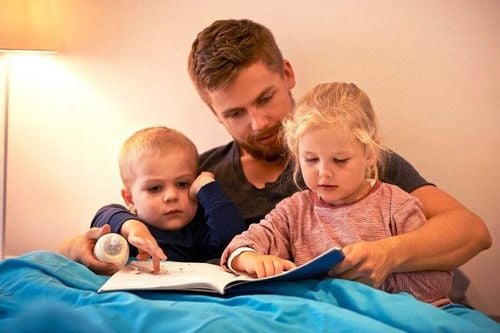This is an automatically translated article.
The article was consulted with Master, Doctor Nguyen Thi An - Pediatrician - Neonatologist - Department of Pediatrics - Neonatology - Vinmec Ha Long International General Hospital.Sleep is an essential foundation for a child's mental and physical health. The American Academy of Pediatrics estimates that sleep problems affect 25% to 50% of children and 40% of adolescents.
Understanding children's sleep needs is the first step to helping them sleep better. Through a combination of sleep, age-appropriate living habits, and paying close attention to any sleep disturbances, you can help your child form healthy sleep habits so they grow up healthy. strong.
1. The Importance of Sleep for Children and Adolescents
Sleep plays a crucial role in young brain development. In addition to directly affecting children's health, research shows that sleep is linked to children's alertness and attention, cognitive performance, mood, resilience, vocabulary acquisition. , learning and memory. Sleep also has important effects on development, especially in childhood. Especially for toddlers, naps play an essential role in consolidating memory and developing cognitive and motor skills.Problems that happen around the child such as teething, illness, child in another place, change of new caregiver, change of schedule, ear infection... can also have an effect. to children's sleep.
In addition to the above problems, about 50% of children have a sleep disorder at some point. Sleep disturbances are closely related to children's physical and mental health. One problem exacerbates another in a cycle that is hard to break. In addition, some sleep disorders do not manifest themselves or reflect different conditions such as epilepsy, making it difficult to diagnose.
Some of the most common sleep disorders in children are night terrors and nightmares, sleep apnea, sleep talking and sleepwalking, snoring and restless legs syndrome.

Trẻ mọc răng có thể ảnh hưởng đến chất lượng giấc ngủ của trẻ
Sleep affects factors such as:
Thinking and academic performance Sleep is beneficial for the brain and promotes attention, memory and analytical thinking. It helps to sharpen thinking, recognize the most important information to reinforce learning. Sleep also facilitates the expansion of thoughts, promoting creativity. Whether it's studying for a test, learning an instrument, or gaining job skills, sleep is essential for kids.
Given the importance of sleep for brain function, it's easy to understand why children who don't get enough sleep tend to suffer from excessive sleepiness and lack of attention. This can affect a child's academic performance.
Mental health Not getting enough sleep causes feelings of irritability and overreaction. Over time, the consequences can be even greater for teenagers who are adjusting to new independence, responsibilities, and social relationships.
Prolonged sleep loss can negatively affect emotional relationships, increase the risk of interpersonal conflicts as well as worsen mental health problems.
Mental health disorders such as anxiety, depression, bipolar disorder are associated with poor sleep and sleep deprivation in children that can increase the risk of suicide. Improving sleep in children plays an important role in preventing mental health disorders or reducing their symptoms.
Physical development Sleep contributes to the function of almost every organ of the body. Sleep strengthens the immune system, helps regulate hormones, and allows for muscle and tissue repair.
Significant physical growth occurs during adolescence and can be negatively affected by lack of sleep. Researchers have found that teenagers who don't get enough sleep affect their metabolism. This can put children at higher risk for diabetes and long-term heart problems.
Decision making and behavior Sleep deprivation can affect the development of the frontal lobes, the part of the brain that is important for controlling impulsive behavior. Many studies have found that children who do not get enough sleep can develop behaviors such as riding a bicycle without a helmet, not wearing a seat belt. Drug use, alcohol use, smoking, fighting and carrying a weapon were also identified as high risks for teenagers who got too little sleep.
Behavioral problems can affect a child's life, impairing his or her academic performance as well as his or her relationships with family and friends.
Accidents and Injuries Not getting enough sleep in children can make them vulnerable to injury and even death. Studies have found that sleep deprivation can reduce reaction time with the same effect as drinking alcohol.

Trẻ ngủ không đủ giấc có thể dẫn đến nhiều rủi ro
2. How much sleep do children need?
When children grow up, they no longer sleep as much as when they were babies, but how much sleep is enough? Every child's sleep time is different, some need more sleep and others need less.Below is a general guide to the average amount of sleep a child needs in about 24 hours.
| Tuổi tác | Ngủ ban đêm | Ngủ ban ngày | Tổng thời gian ngủ trung bình |
| 2 năm | 10 đến 12 giờ | 1 đến 3 giờ (1 giấc ngủ ngắn) | 11 đến 14 giờ |
| 3 năm | 10 đến 12 giờ | 1 đến 3 giờ (1 giấc ngủ ngắn) | 10 đến 13 giờ |
| 4 năm | 10 đến 13 giờ | 0 đến 2,5 giờ (1 giấc ngủ ngắn hoặc không ngủ trưa) | 10 đến 13 giờ |
| 5 năm | 10 đến 13 giờ | 0 đến 2,5 giờ (1 giấc ngủ ngắn hoặc không ngủ trưa) | 10 đến 13 giờ |
| 6 năm | 9 đến 12 giờ | 0 | 9 đến 12 giờ |
| 7 năm | 9 đến 12 giờ | 0 | 9 đến 12 giờ |
| 8 năm | 9 đến 12 giờ | 0 | 9 đến 12 giờ |
| * Lưu ý: Trẻ ngủ trưa lâu hơn có xu hướng ngủ ít giờ hơn vào ban đêm và ngược lại. |
If you think your child may be sleep deprived, ask yourself some questions:
How often does your child fall asleep in the car? Does your child need you to wake him up in the morning? Does your child appear cranky or overly tired during the day? If the answer is yes, your child may not be getting enough sleep. To change this, you need to help children with good sleep-related habits, such as building a consistent bedtime routine, setting a consistent bedtime.
Preschoolers nap more, so they need 10 to 13 hours of sleep each day, this amount of time will decrease as children get older. By the age of 14, children need 8 to 10 hours of sleep a day.

Thời gian ngủ của trẻ phụ thuộc vào từng độ tuổi khác nhau
3. How to help children sleep well
3.1 For young children
Sleep needs to change as your child gets older, but whether he's still a toddler or an adult, getting him to sleep on time is helpful to ensure he's getting enough sleep. Try to do the same activities each day in the same sequence so your child knows what to expect.A typical bedtime routine might include:
Turning off the computer, television and other bright lights Put on pajamas and brush teeth Read a book, sing a lullaby or give the child a warm bath Take the child items (blankets) or stuffed animals that your child loves The best time to put your baby to bed is when they are sleepy, not when they are already asleep. This helps children learn to fall asleep on their own. If preschoolers wake up in the middle of the night, put them back in bed. It's best not to let an infant sleep in the same bed as you, as co-sleeping increases the risk of sudden infant death syndrome.

Ba mẹ có thể duy trì thói quen đọc sách trước khi ngủ cho trẻ
Daytime habits also affect sleep. You can sleep comfortably in your baby by following these basic rules:
Arrange a balanced schedule with time for rest and play. Do not turn on the computer or TV in the bedroom, even during the day. Eat a sensible diet Create a cool sleeping space Use dark curtains to block out light or a night light if your child is afraid of the dark Keep the bedroom quiet or use a white noise machine to mask outside sounds In addition Avoid caffeine, avoid overeating and sugary foods before bedtime, choose a healthy bedtime snack if necessary It is important for your child to get regular exercise, but don't force it. Children are tired of these activities so that they sleep better at night.
To help babies sleep well, it is important to note: Because babies have not yet formed their circadian rhythms, young children rarely sleep through the night. If your baby doesn't go back to sleep on his own, try soothing him by talking or touching without picking him up. If your baby continues to cry, he may be hungry or need a diaper change. Fix the problem quickly and quietly, using only a night light if possible and gently.
To help your toddler sleep well, it's important to note: Toddler sleep is often supplemented by two naps a day. Toddler sleep problems include anxiety about being separated from mother or caregivers, which leads to stubborn, irritable children at bedtime. You can work around this situation by giving your child some control over small choices like what to wear to pajamas or what book to read. Try to be patient, firm but still gentle with the child, do not be angry or intimidate the child because this only backfires, the child will react more strongly to your actions.
Sleep tips for preschoolers: Between academic, social, and extracurricular obligations, school-age children often have so many activities that it can be difficult to get a good night's sleep. Whenever possible, try to stick to a consistent schedule and relaxation time before bed. To strengthen the connection between the bedroom and sleep, let your child do homework or other activities in another room if possible.
Mornings are also important, and while a lot of kids enjoy sleeping in on weekends, it can disrupt their sleep schedule and make it harder for them to wake up during the week. Try not to over-schedule extracurricular activities if you find these activities to have an adverse effect on your child's sleep time.

Nếu trẻ gặp vấn đề gì về giấc ngủ, ba mẹ có thể đưa trẻ đi khám sớm
Children's sleep problems play an important role, especially, children in the period from 6 months to 3 years old are very prone to problems with the respiratory system, respiratory infections, skin diseases. and gastrointestinal infections,... Parents need to pay special attention to the care and provision of adequate nutrition for children. Pediatrics Department at Vinmec International General Hospital is the address for receiving and examining diseases that infants and young children are susceptible to: viral fever, bacterial fever, otitis media, pneumonia in children With a system of facilities, modern medical equipment, sterile space, minimizing the impact as well as the risk of disease spread, Vinmec will bring satisfaction to customers. and is highly appreciated by industry experts with:
Gathering a team of leading pediatricians: Including leading experts with high professional qualifications (professors, associate professors, doctors, Master's degree), experienced, worked at major hospitals such as Bach Mai, 108.. The doctors are all well-trained, professional, conscientious, knowledgeable about young psychology. In addition to domestic pediatric specialists, the Department of Pediatrics also has the participation of foreign experts (Japan, Singapore, Australia, USA) who are always pioneers in applying the latest and most effective treatment regimens. . Comprehensive services: In the field of Pediatrics, Vinmec provides a series of continuous medical examination and treatment services from Newborn to Pediatric and Vaccine,... according to international standards to help parents take care of their baby's health from birth to childhood. Advanced techniques: Vinmec has successfully deployed many specialized techniques to make the treatment of difficult diseases in pediatrics more effective: neurosurgery - skull, stem cell transplant blood in cancer treatment. Professional care: In addition to understanding children's psychology, Vinmec also pays special attention to the children's play space, helping them to play comfortably and get used to the hospital's environment, cooperate in treatment, improve the efficiency of medical treatment.
Please dial HOTLINE for more information or register for an appointment HERE. Download MyVinmec app to make appointments faster and to manage your bookings easily.
Reference source: babycenter.com













